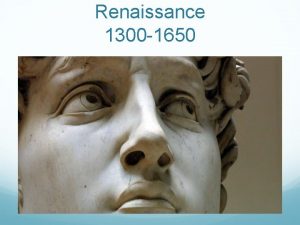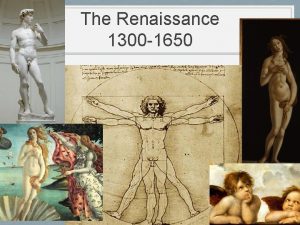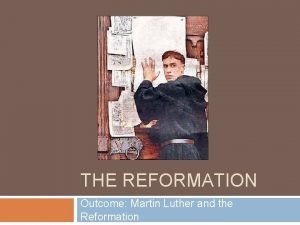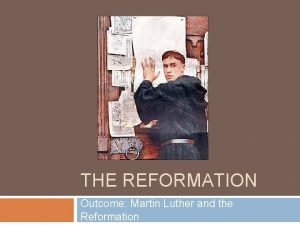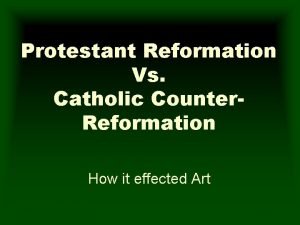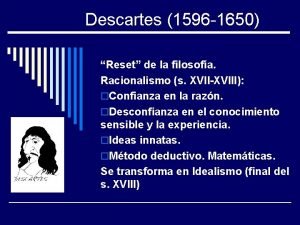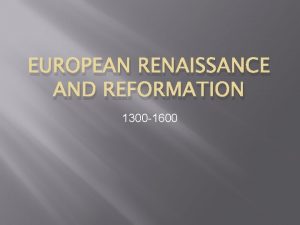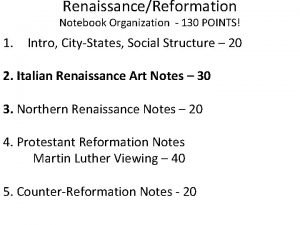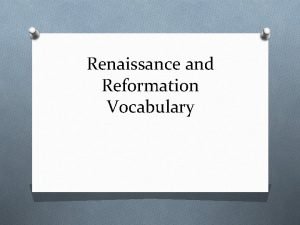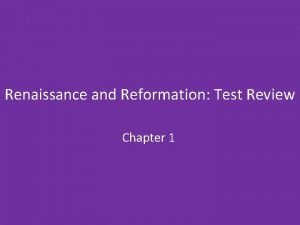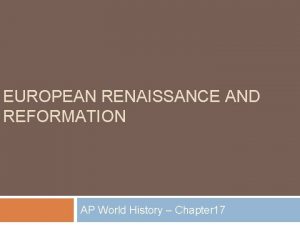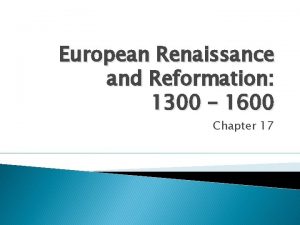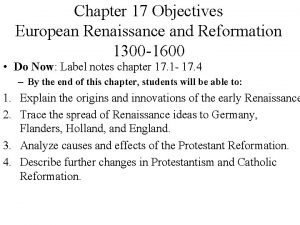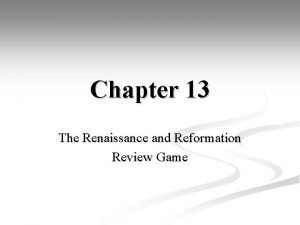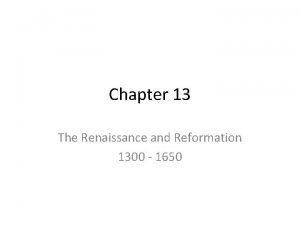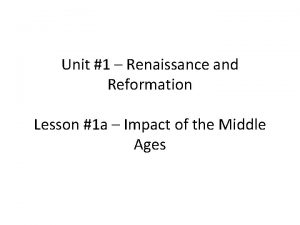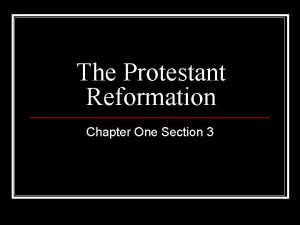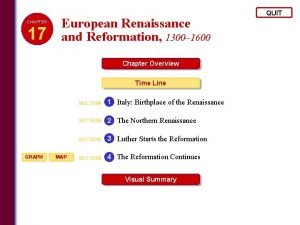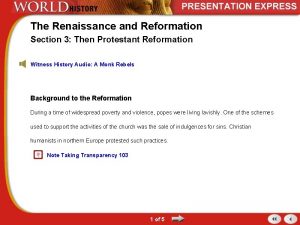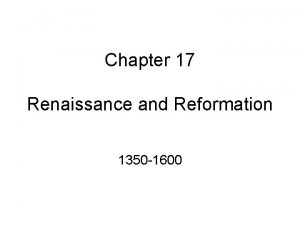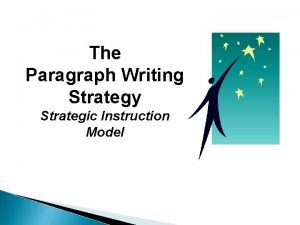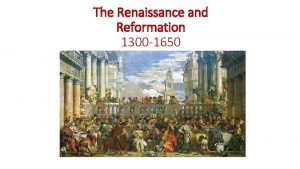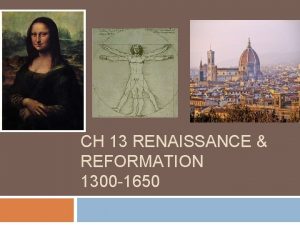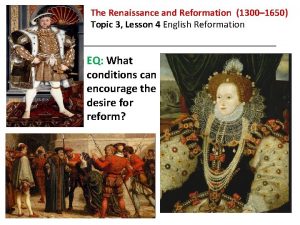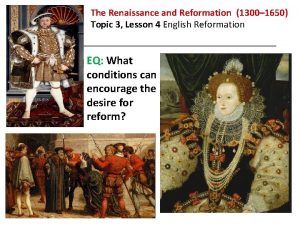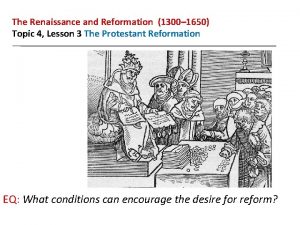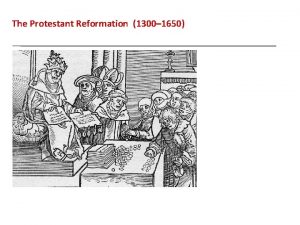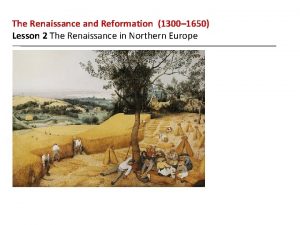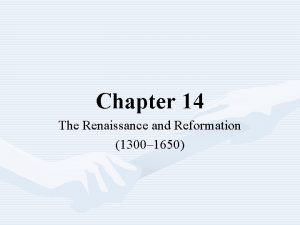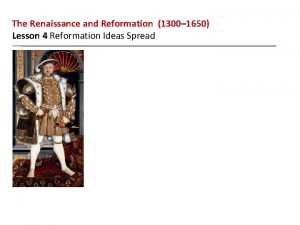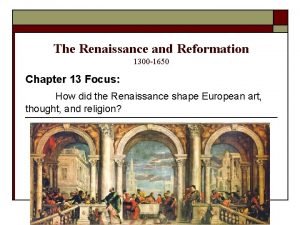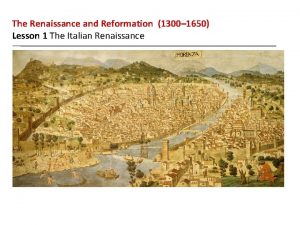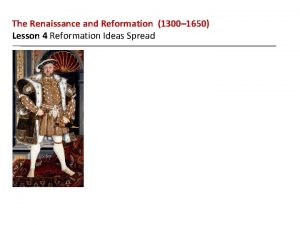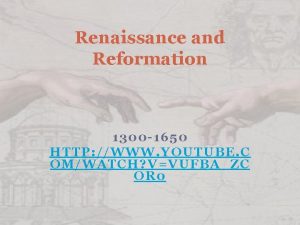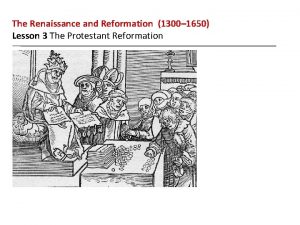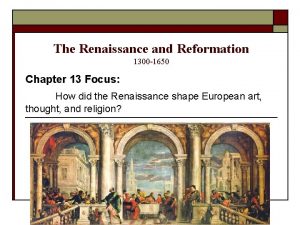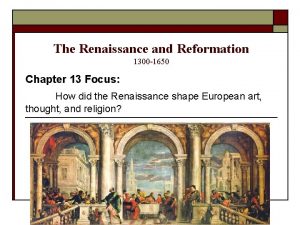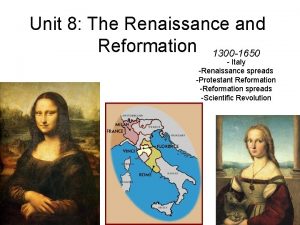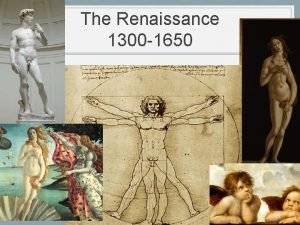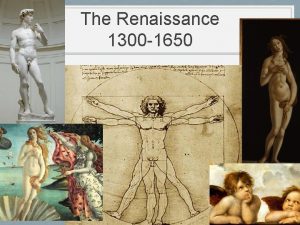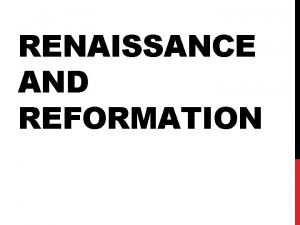The Renaissance and Reformation 1300 1650 Topic 4
























- Slides: 24

The Renaissance and Reformation (1300– 1650) Topic 4, Lesson 3 The Protestant Reformation EQ: What conditions can encourage the desire for reform?

The Renaissance and Reformation (1300– 1650) Lesson 3 The Protestant Reformation Learning Objectives • Summarize the factors that encouraged the Protestant Reformation. • Explain the impact of the printing press on the Reformation. • Analyze Martin Luther's role in shaping the Protestant Reformation. • Explain the teachings and impact of John Calvin.

The Renaissance and Reformation (1300– 1650) Lesson 3 The Protestant Reformation Key Terms • • • indulgence Martin Luther Wittenberg Charles V diet John Calvin predestination Geneva theocracy

The Protestant Reformation Suppose you live in a small town. Everyone knows each other. Also, everyone has the same beliefs. However, one day you decide to complain about the community’s serious problems. You make a list of everything that is wrong with your community. You post this list in in a public area in town. Answer the following in one paragraph: -What would happen in the town? -How do you think people would react? -Would people change their beliefs because of your list? http: //www. history. com/topics/reformation

Causes of the Reformation • During the Renaissance, Christians from all levels of society grew tired of the corruption of the clergy (church members) of the Roman Catholic Church. In the words of one unhappy peasant, “Instead of saving the souls of the dead and sending them to Heaven, [the clergy] gorge themselves at banquets after funerals. . . They are wicked wolves! They would like to devour us all, dead or alive. ”

Causes of the Reformation Take Independent Notes pg. 244 -45 • Abuses Within the Church • Early Reformers

What sparks the Reformation? • Abuses within the Church • Pope Leo X needed money to build St. Peter’s Basilica…so he sold indulgences! – Pardons issued by the Pope – People could buy them get out of purgatory = (Buy forgiveness for sins!)

Martin Luther's Protests Bring Change • Protests against the Church continued to grow. • In 1517, these protests erupted into a full scale revolt. • The man who triggered the revolt was a German monk and professor of theology named Martin Luther.

Martin Luther • • Protestant Reformation leader. He was disillusioned with what he saw as the corruption of the Church

95 Theses Challenge the Church • Johann Tetzel set up a shop outside Wittenberg —sold indulgences to assure entry into heaven for the buyers and dead relatives. • Luther is outraged—and wrote 95 Theses (arguments) against indulgences.

Luther’s 95 Theses • In 1517, his 95 Theses were nailed to a church door. Luther’s intention: NOT TO BREAK WITH CHURCH, BUT REFORM IT! – He Criticized: 1. Indulgences—no mention of them in the bible? 2. Power of Pope—could not release souls from Purgatory 3. Wealth of Church

Effects of Luther’s Actions • Printing press— help distribute 95 Theses across Europe • Started a debate • Diet of Worms— Luther is summon by King Charles V to an assembly (meeting) During the 1500 s, European villages were busy places, with markets, artisan shops, and homes. The church was the center of village life.

Excommunication • Pope Leo X excommunicated Luther in 1520. – Excommunicationexpelled – Holy Roman Emperor Charles V tried stop Luther’s writings. – Princes in Germany issued a protestatio or protest—they protected Luther. • http: //www. history. com/topics/martin-luther-and-the-95 theses

Luther’s Teachings and Changes Luther’s Teachings (Beliefs) Luther’s Wanted Changes: 1. 2. 3. 4.

Bell Ringer: • What impact did the printing press have on the Protestant Reformation?

Martin Luther's Protests Bring Change Martin Luther nails his 95 Theses to the church door in Wittenberg. The theses also contained an invitation to church leaders to debate Luther on the issues raised by his theses. The invitation was ignored.

Luther’s Teachings • God’s Grace is won by FAITH ALONE! • The Bible is the sole source of religious truth. • Priests and church members don’t have special powers—all Christians have the power to reach God. • He translated the bible into the German vernacular language.

The Peace of Augsburg (1555) • In the Peace of Augsburg, Charles V allowed the German Princes to decide which religion—Protestant or Catholic—their kingdoms would follow. • Northern Germany Lutheran, and Southern Catholic

John Calvin Challenges the Church • In the wake of Luther’s revolt against the Church, other reformers challenged Church authority. • The most important was John Calvin, who lived in what is today Geneva, Switzerland. • Calvin’s ideas had a profound effect on the direction of the Protestant Reformation.

John Calvin’s Predestination • Calvin was born in France—priest and lawyer • Like Luther he believed that people can be saved by faith alone and the Bible was the only source of religious truth • However, believed that by nature humans were sinful—God alone decided who will achieved eternal life—predestination. https: //www. biography. com/video/john-calvin-the-origins-of-calvinism-26409539800

John Calvin Review Questions 1. Explain what is Calvinist Geneva and how people lived there? 2. Where did Calvinism took root? 3. What effect did the spread of Calvinism have in Europe?

Calvinism • Calvin led a community of religious followers in Geneva—Calvinist Geneva • Community stressed—hard work, morality, thrifty, honesty • Harsh punishments or fines for disobedience • Calvinism spreads— Germany, France, Netherlands, England, Scotland—at times wars break out (France)

John Calvin Challenges the Church The Calvinist belief in simplicity is reflected in the design of this Calvinist church in Nuremberg, Germany. No images of saints or religious leaders decorate the church, and the preacher's pulpit is the center of focus.

John Calvin Challenges the Church Analyze Charts Who served as head of the Lutheran Church? Why was this an important difference from the organization of the Catholic Church?
 1650-1300
1650-1300 Borgias and medicis
Borgias and medicis Topic 4 the renaissance and reformation
Topic 4 the renaissance and reformation The reformation outcome martin luther and the reformation
The reformation outcome martin luther and the reformation The reformation outcome martin luther and the reformation
The reformation outcome martin luther and the reformation What is the “renaissance rebirth?”
What is the “renaissance rebirth?” Protestant reformation vs counter reformation
Protestant reformation vs counter reformation Descartes 1596 à 1650
Descartes 1596 à 1650 Who wrote praise of folly
Who wrote praise of folly Renaissance and reformation interactive notebook
Renaissance and reformation interactive notebook Renaissance and reformation vocabulary
Renaissance and reformation vocabulary Chapter 1 renaissance and reformation
Chapter 1 renaissance and reformation European renaissance and reformation answer key
European renaissance and reformation answer key Chapter 17 european renaissance and reformation
Chapter 17 european renaissance and reformation European renaissance and reformation chapter 17
European renaissance and reformation chapter 17 Chapter 13 renaissance and reformation
Chapter 13 renaissance and reformation Chapter 13 renaissance and reformation
Chapter 13 renaissance and reformation Unit 4 lesson 1 the renaissance
Unit 4 lesson 1 the renaissance The renaissance and reformation section 3 quiz answer key
The renaissance and reformation section 3 quiz answer key Chapter 1 european renaissance and reformation
Chapter 1 european renaissance and reformation Chapter 12 renaissance and reformation worksheet answer key
Chapter 12 renaissance and reformation worksheet answer key The renaissance and reformation section 3 quiz
The renaissance and reformation section 3 quiz Chapter 17 renaissance and reformation
Chapter 17 renaissance and reformation How to write a clincher sentence
How to write a clincher sentence Narrow topic examples
Narrow topic examples
